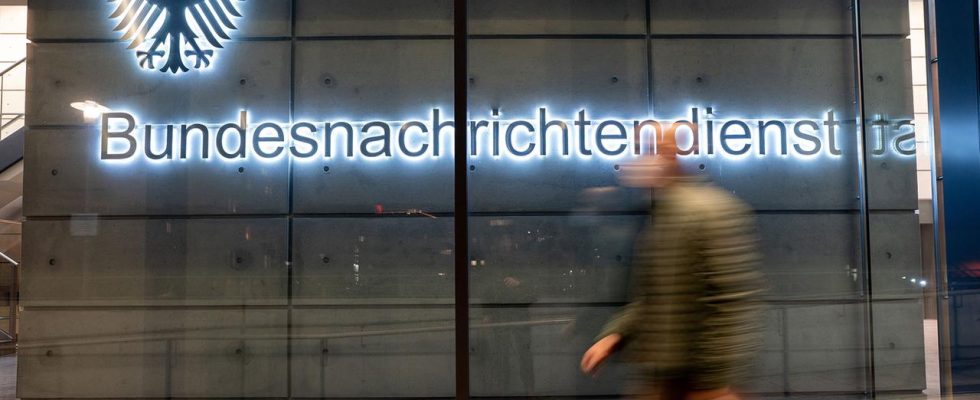exclusive
The BND must obtain approval from a control council for surveillance measures abroad. But is he strict enough? This was controversial within the committee. Now the deputy boss and another member are apparently leaving the council.
If the Federal Intelligence Service (BND) wants to tap a Russian general’s phone or hack into the computer of a North Korean arms dealer, the service has not been allowed to do so for some time now. The BND must obtain prior approval for such surveillance measures. Namely from the Independent Control Council (UKRat).
This authority has existed since January 2022. The committee, consisting of judges, has since then controlled the BND’s technical intelligence, i.e. tapping telephones, secretly reading emails and even hacking computers. They check in advance whether all legal requirements for such surveillance measures are met – or not.
Personnel consequences
It has been no secret for some time that the mood in the new control authority is said to be quite bad. Apparently there are different ideas about how strictly and how transparently the UK Council should control BND espionage. Now there are probably the first personnel consequences.
According to information from WDR and NDR Vice President Till Oliver Rothfuß wants to leave the committee in the coming weeks. The lawyer is said to have then asked to be able to return to his previous position as a judge at the Federal Administrative Court. According to reports, in addition to the deputy, another member, judge Elisabeth Steiner, would like to leave the council soon. A decision on the successor should also be made soon. For the judicial-like control body with its six judge positions, this means a significant upheaval just two years after it was founded.
The people who are now apparently leaving did not want to comment when asked. The control authority was also tight-lipped. “I ask for your understanding that I generally cannot comment on ongoing personnel matters,” said a spokeswoman for the control authority when asked.
Dispute over transparency
The internal dispute over the course of the institution, which the Editorial Network Germany (RND) also reported on in January, is escalating: Rothfuß is said to have advocated, among other things, that the control activities of the UK Council be presented more comprehensively to the Parliamentary Control Committee and the Federal Government. Chairman Josef Hoch, on the other hand, is said to insist on the independence of the committee and apparently fears that such an insight into the engine room would create pressure to justify himself.
Another sticking point in the discussion is the question of whether the UK Council controls the foreign intelligence service strictly enough. Information about it is secret. But researched last year WDR and NDR Details of the first activity report that the authority prepared: The approximately 60-page document shows that the Council had allowed practically every surveillance measure requested by the BND.
A total of 121 surveillance measures had been examined by the UK Council by then. The judges only lowered their thumbs once. It is said to have been about a company in Germany with contacts in Russia, whose electronic communications were said to have been monitored by the BND. However, this was not covered by the BND law.
Debates and discontent
Since then, the question of whether the inspectors are carrying out proper inspections given this quota has not only been discussed behind closed doors: voices have also become louder in the federal government and in parliament, demanding, for example, more written and oral reports from the UK Council. Or so-called special opinions, in which secret judges can make it clear internally if they have a different opinion than the majority during a control process. The question of whether individual council members should be responsible for certain topics and specialist areas is said to have repeatedly caused debates and discontent within the authority in the past.
The fact that there are discussions about the body’s course is not unexpected: the Control Council is a newly created instrument in the area of intelligence control and has considerable power. It was set up as a result of changes in the law and rulings in connection with the revelations of extensive spying operations by the US secret service National NSA and the BND. This is intended to ensure more precise control of strategic telecommunications intelligence, the monitoring of global data traffic.
“Court-like Negotiations”
In the struggle over the direction of the committee, Control Council President Hoch often took a different position than his deputy. Hoch is said to have insisted internally on the independence of the committee and saw the danger of making decisions that were popular with politicians, for example in the Chancellery responsible for the BND. Special votes are already possible now.
In an interview with the Neue Juristische Wochenzeitung a few weeks ago, Hoch also defended the low rejection rate of surveillance actions: Numbers about “prior checks” do not say much about the influence of the control authority, according to Hoch.
“Their mere existence leads to concentration, documentation, precision and restrictions within the BND,” explained the president. Because of the “court-like negotiations,” applications are sometimes “revoked in whole or in part.” “On the whole,” said Hoch, the regulations were successful. Obviously not everyone saw it that way.
Within the federal government, however, there are plans for a separate law for the Independent Control Council, whose legal mandate is currently anchored in the BND law. A first draft of a UKCouncil law was presented in August last year.

